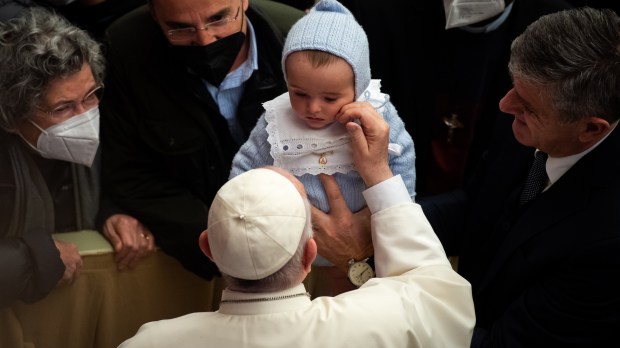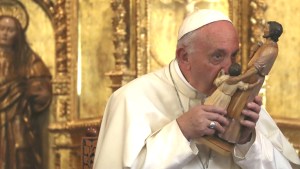Pope Francis reflected on St. Joseph as a man of prayer and a deep spiritual life, at the general audience of January 26. This led him to consider the struggles of parents who face problems with their children.
Children with many illnesses, children who are sick, even with permanent maladies. — how much pain is there! — parents who see different sexual orientations in their children; how to deal with this and accompany their children and not hide in an attitude of condemnation. Parents who see their children leaving because of an illness, and also — even sadder, we read about it every day in the newspapers — children who get into mischief and end up in a car accident. Parents who see their children not progressing in school and don’t know how… So many parental problems. Let’s think about it: how to help them.
And to these parents I say: don’t be scared. Yes, there is pain. A lot. But think of the Lord, think about how Joseph solved the problems and ask Joseph to help you. Never condemn a child.
Joseph prayed, worked, and loved — three beautiful things for parents: to pray, to work, and to love — and because of this he always received what he needed to face life’s trials. Let us entrust ourselves to him and to his intercession.
Joseph knew how to listen to God
Pope Francis considered how St. Joseph was able to discern the voice of God from within the many other voices that we have within us.
For example, the voices of our fears, the voices of past experiences, the voices of hopes; and there is also the voice of the evil one who wants to deceive and confuse us. It is therefore important to be able to recognise the voice of God in the midst of other voices. Joseph demonstrates that he knows how to cultivate the necessary silence and, above all, how to make the right decisions before the Word that the Lord addresses to him inwardly.
The Holy Father reflected on each of Joseph’s four dreams recounted in the Gospels, explaining that, “In the Bible, as in the cultures of ancient peoples, dreams were considered a means by which God revealed himself. The dream symbolises the spiritual life of each of us.”
Dream 1: for situations without a solution
In the first of Joseph’s dreams, God resolves the “problem” of Mary’s pregnancy, telling Joseph to take her as his wife. The Pope reflected that these situations that seem to have no solution are opportunities for prayer:
Life often puts us in situations that we do not understand and that seem to have no solution. Praying in these moments — this means letting the Lord show us the right thing to do. In fact, very often it is prayer that gives us the intuition of the way out. Dear brothers and sisters, the Lord never allows a problem to arise without also giving us the help we need to deal with it. He does not cast us alone into the fire. He does not cast us among the beasts. No. When the Lord shows us a problem, or reveals a problem, he always gives us the intuition, the help, his presence, to get out of it, to resolve it.
Dream 2: in danger
Joseph’s second dream took him away from Herod and his murderous rampage. The Holy Father said that when we turn to God in danger, we can find Joseph’s courage:
In life we all experience dangers that threaten our existence or the existence of those we love. In these situations, praying means listening to the voice that can give us the same courage as Joseph, to face difficulties without succumbing.
Dreams 3 and 4: in fear
The third and fourth of Joseph’s dreams come as he awaits the sign that he can return to his homeland. The Gospel recounts that Jesus’ father on earth experienced fear: But on the return journey, “when he heard that Archelaus reigned over Judea in place of his father Herod, he was afraid to go there.” The Pope said that fear is part of life, but we should let God guide us through it.
Fear is also part of life and it too needs our prayer. God does not promise us that we will never have fear, but that, with His help, it will not be the criterion for our decisions. Joseph experiences fear, but God also guides him through it. The power of prayer brings light into situations of darkness.
Always there
The reflection on Joseph’s dreams led the Pope to consider the suffering of parents mentioned above. He reminisced about his experience in Argentina, seeing mothers waiting to see their children in jail:
It fills me with compassion — it did in Buenos Aires — when I got on the bus and it passed in front of the prison. There was a queue of people who had to go in to visit the prisoners. And there were mothers there. And I was so touched by this mother who, faced with the problem of a son who has made a mistake and is in prison, doesn’t leave him alone, puts her face forward and accompanies him. This courage; the courage of a father and mother who always, always accompany their children. Let us ask the Lord to give this courage to all fathers and mothers, as he gave it to Joseph. And to pray, no? Pray that the Lord will help us in these moments.
Prayer has to be linked to love, or it isn’t prayer
Finally, the Pope reiterated a point he has made often about prayer: that it must be plugged into reality, into the concrete needs of life.
Prayer, however, is never an abstract or purely internal gesture, like these spiritualist movements that are more gnostic than Christian. No, it’s not that. Prayer is always inextricably linked to charity. It is only when we combine prayer with love, the love for children in the cases I just mentioned, or the love for our neighbour, that we are able to understand the Lord’s messages.
Joseph prayed, worked, and loved — three beautiful things for parents: to pray, to work, and to love — and because of this he always received what he needed to face life’s trials. Let us entrust ourselves to him and to his intercession.


